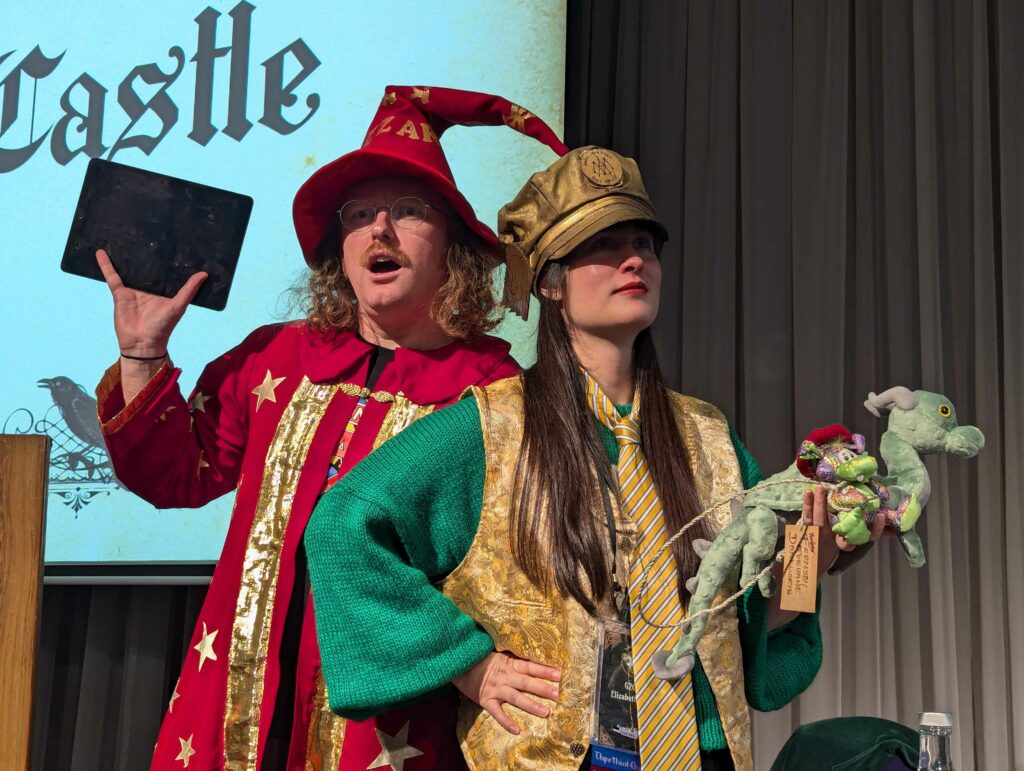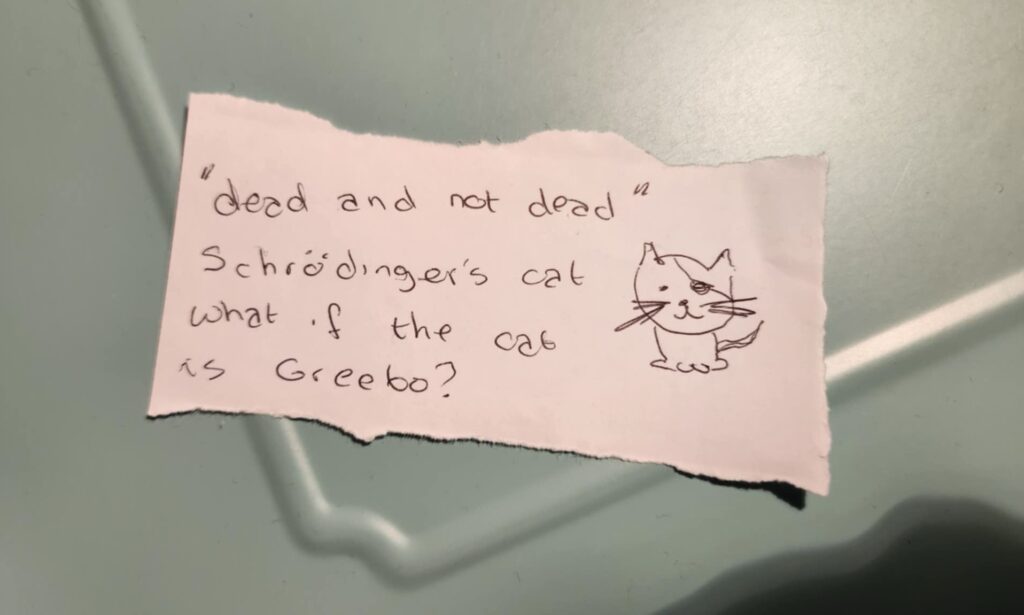#Pratchat82 Notes and Errata
These are the episode notes and errata for Pratchat episode 82, “Clack Go the Gears”, discussing Leonard Boyd and David Brashaw’s 2015 board game Clacks, based on Pratchett’s 33rd Discworld novel, Going Postal, with guests Nicholas J Johnson and Lawrence Leung.
Iconographic Evidence
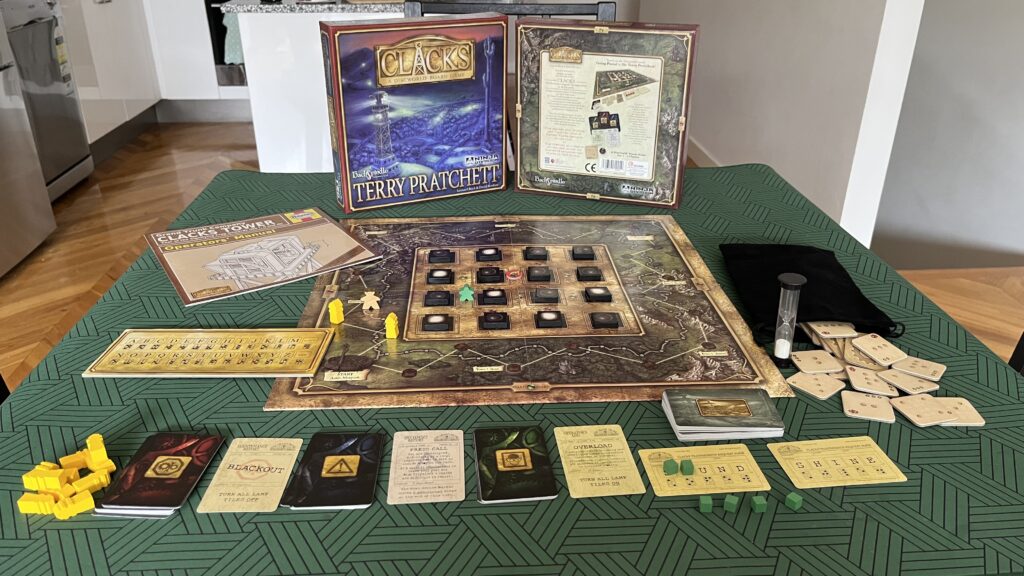
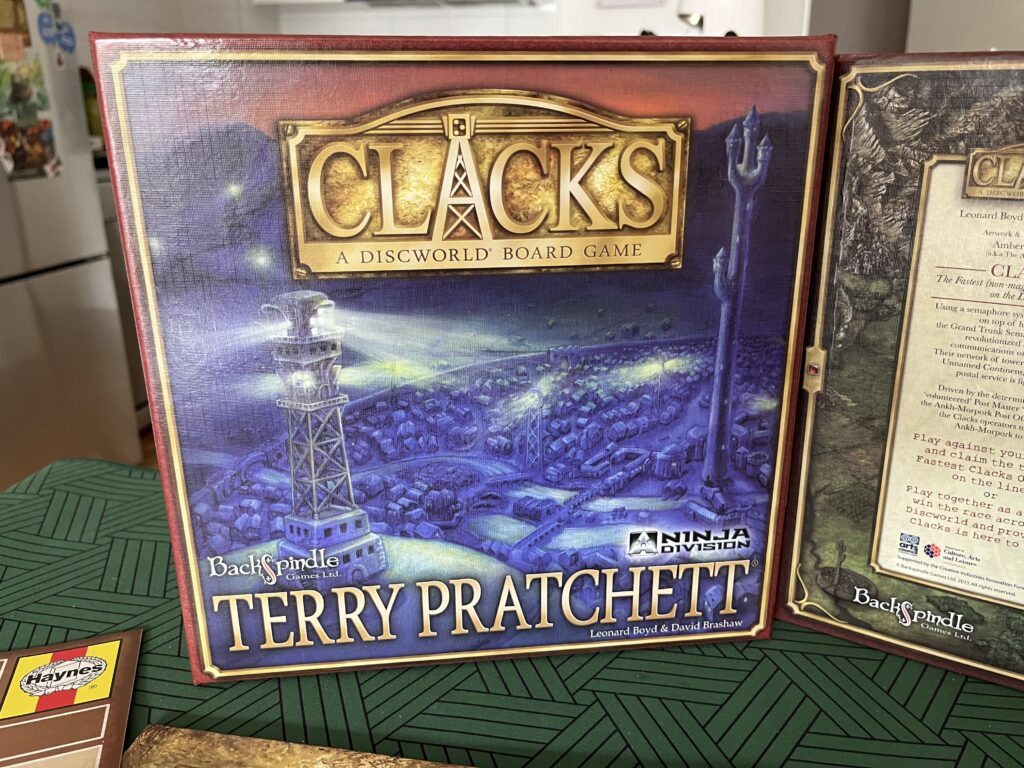
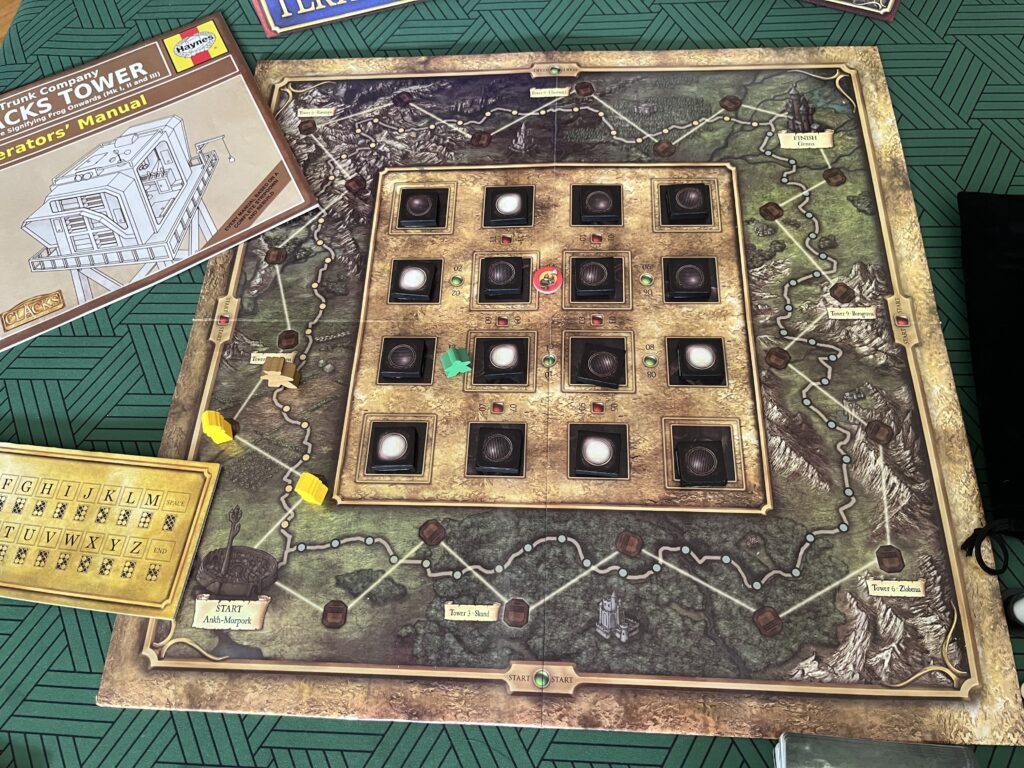
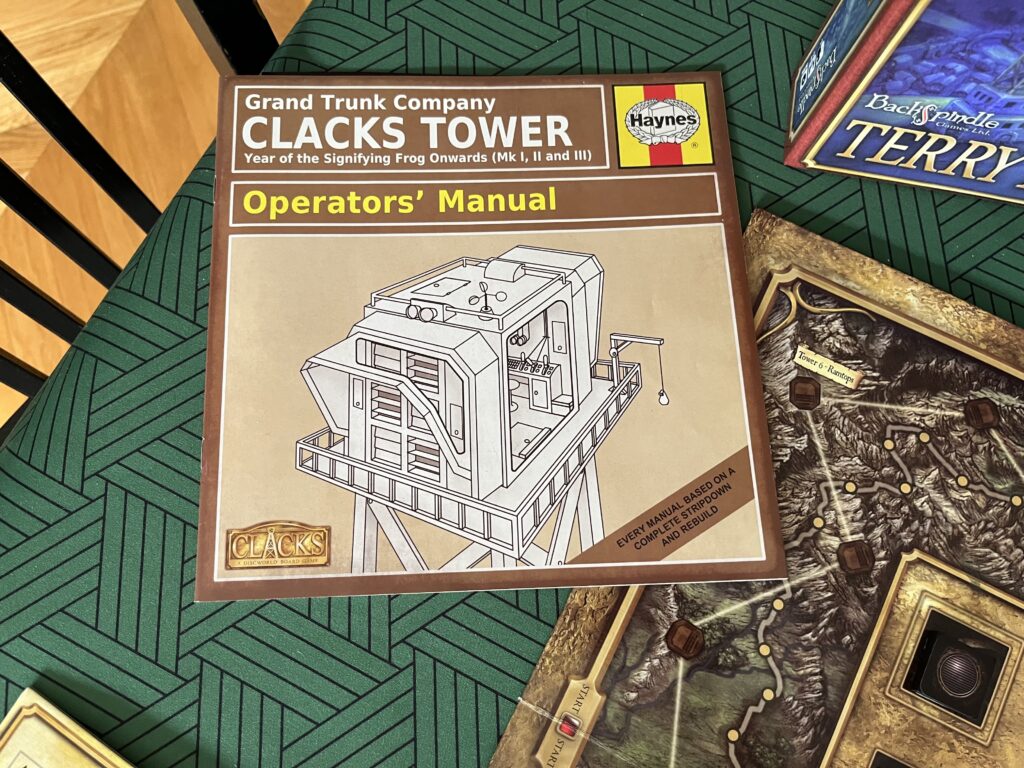
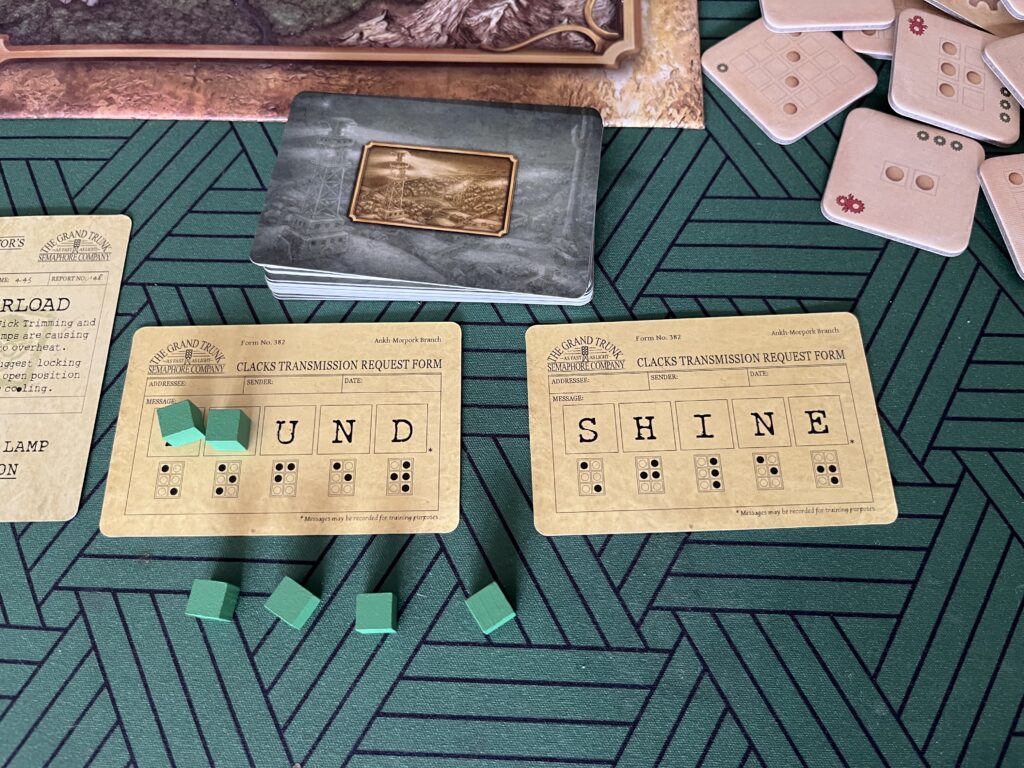
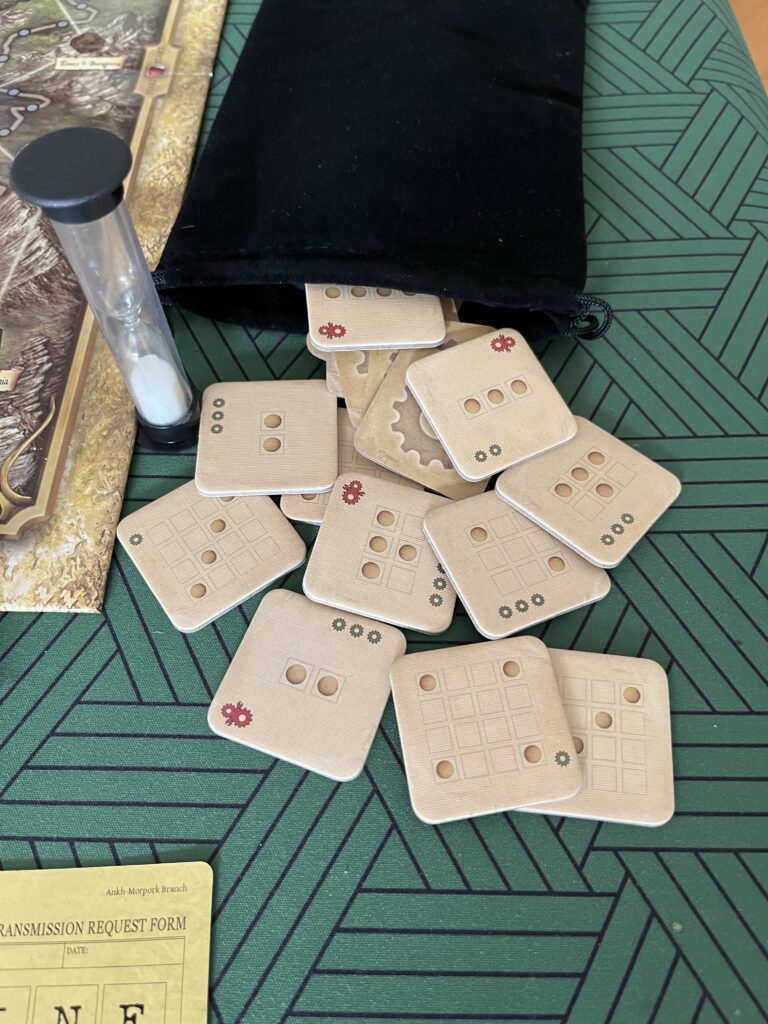
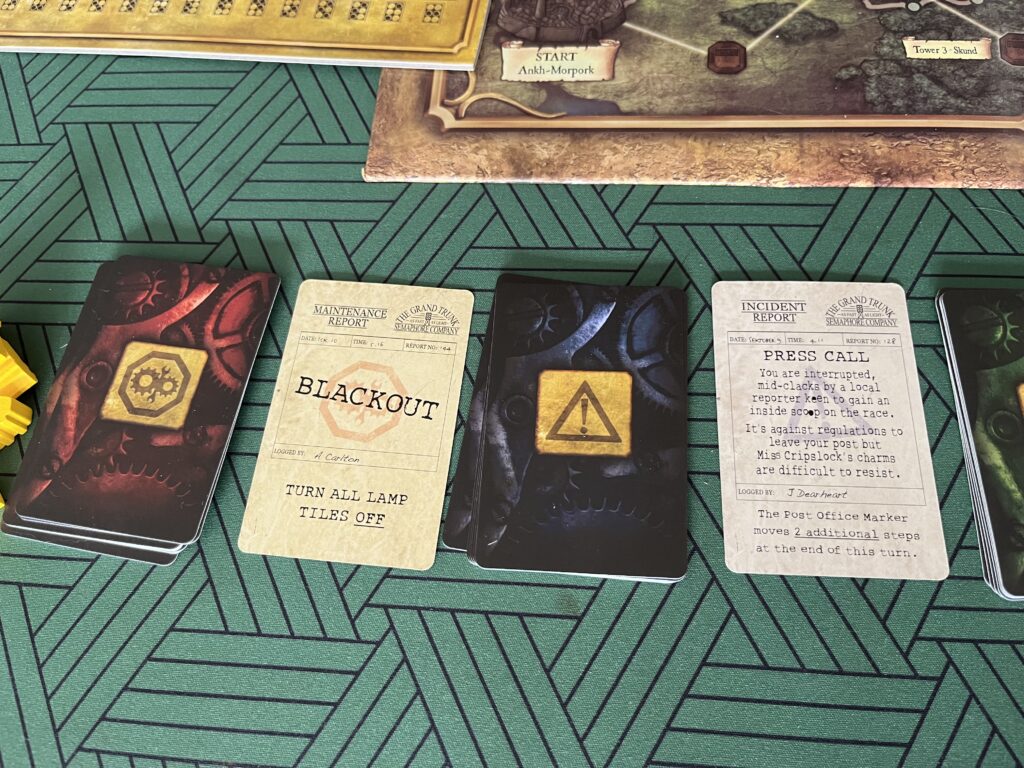
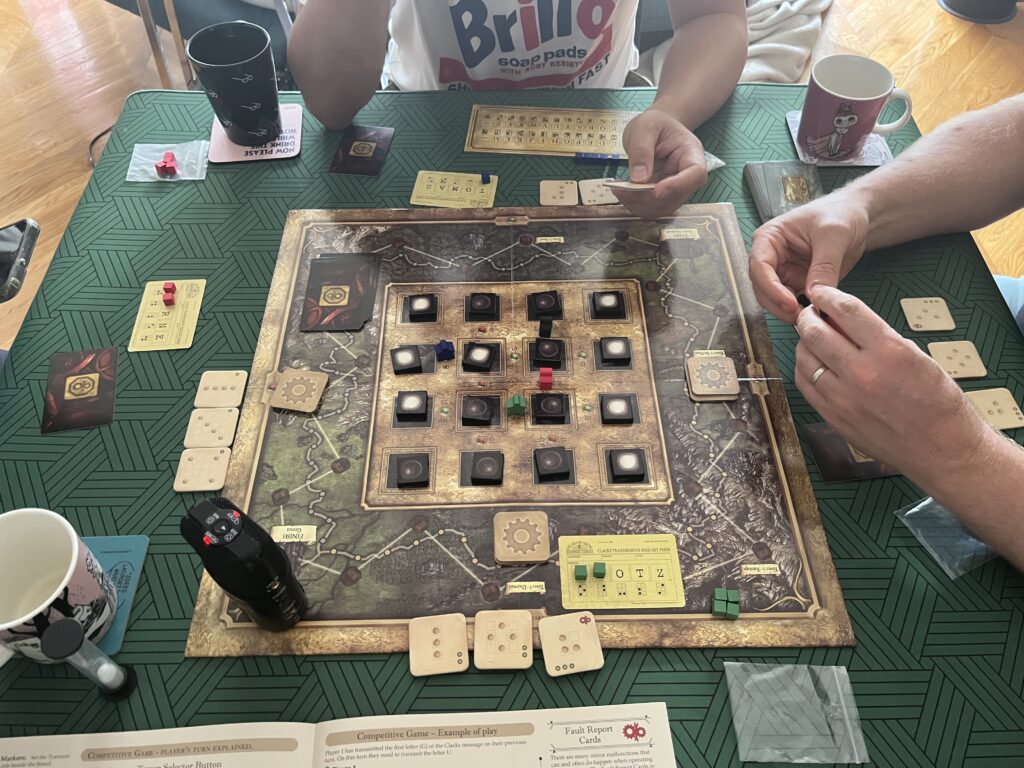
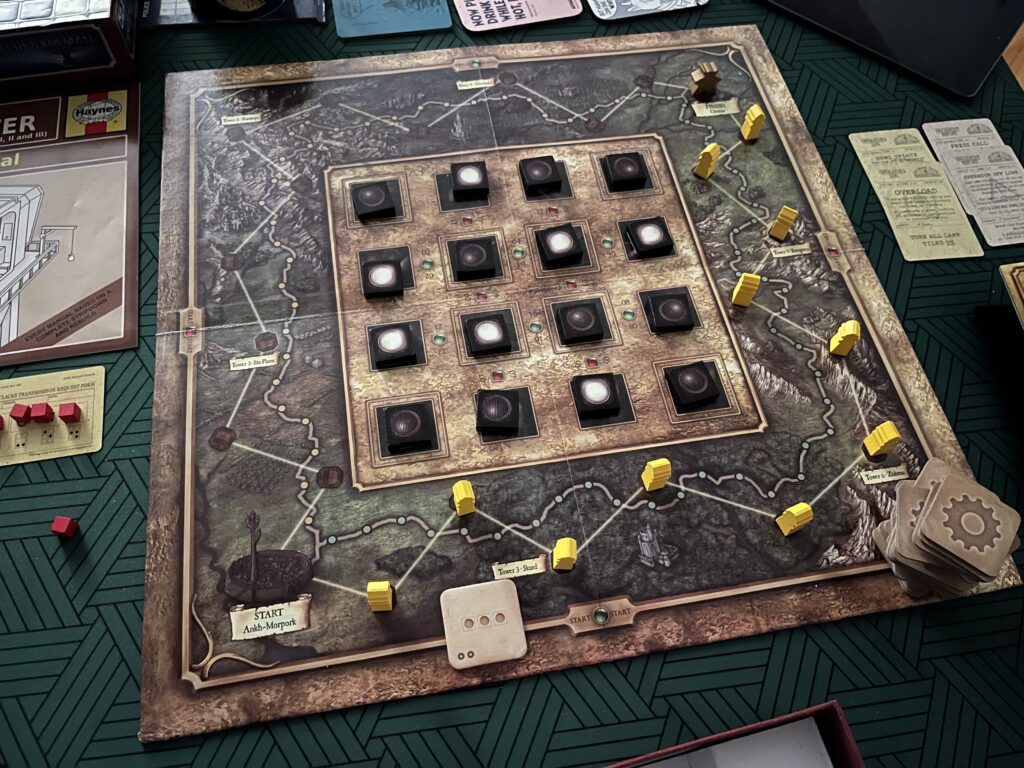
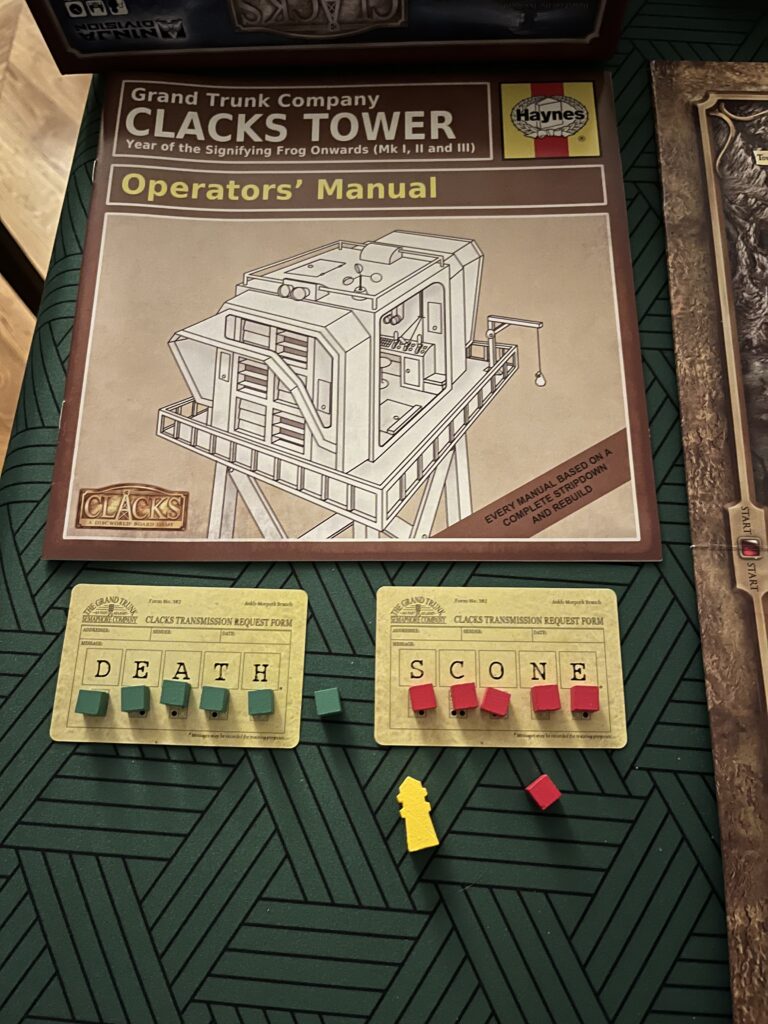
Notes and Errata
- The episode title repurposes “Click Go the Shears”, a popular Australian folk song about sheep shearers. The song’s lyrics were first published as “The Bare-Belled Ewe” in 1891, though the original author is known only as “C. C.”. It’s set to the American Civil War tune “Ring the Bell, Watchman” by Henry Clay Work from 1865, and the first verse parodies the lyrics of the original. It wasn’t widely popular until it was republished and recorded in the 1950s, but is now very well known. Ben used “gears” for the rhyme in the title, but of course it’s the shutters that make the clacking noise in the towers. Ben had a go at a full Clacks-based chorus:
Clack go the shutters, boys, clack clack clack!
Quick eye and hands as you send a signal back
Check it twice for errors and then add it to the queue
And watch the drop so you don’t end up as a GNU! - Nick and Lawrence were previously guests to discuss Going Postal in #Pratchat38, “Moisten to Steal”, back in December 2020. We also have notes for that episode, which include quite a bit about the real-world precedents for the Clacks.
- Ben’s had a look but so far hasn’t been able to identify the craft book that showed him how to make a zither. We’ll add it if he does! A zither, by the way, is a wooden stringed instrument with no neck. It looks and sounds a bit like a cross between a harp and a guitar.
- The correct name for the “craw” of a zither or other wooden string instrument is, in fact…sound hole! Who’d have thought. Holes with specific shapes can have more specific names, like the “f-holes” in violins.
- The Collector’s Edition of Clacks was released in 2021. While Ben is correct in his footnote that it was originally planned for the 5th anniversary in 2020, its official name is “Collector’s Edition”; it just also has “5th Anniversary” written in the top left corner of the box’s cover.
- Mousetrap is a classic board game for children first published in 1963. Like many games of this era, it has a great gimmick, but is otherwise…not very good. In Mouse Trap’s case, the gimmick is a set of small plastic buckets, see-saws, ladders, balls, pipes and other household objects. As players roll dice and move their mice pieces around the path on the board, they gain and lose wedges or cards representing pieces of cheese, and assemble the toys into a Rube Goldberg-style contraption with a cage suspended over a final space. In the original design (including the 1986 Milton Bradley edition that Ben played as a child), the game ends with the players continuing to circle a final loop in the path on the board. One of these final spaces allows a player to rotate the crank that might set off the trap and capture a mouse, and the game ends when only one mouse is left. The original version includes a diver and a bathtub, though its been revised a few times – including getting rid of the final loop, and making the objective to collect the most cheese. A new version, first published in 2001, has a new trap design which replaces the bathtub with a toilet, but the original is still in print.
- In The Lord of the Rings, the warning beacons of Gondor are bonfires on mountaintops used to signal alarm in the kingdom of Gondor. They are lit during The Return of the King; in the book there are seven, and they’re lit when news of the invading fleet of ships is received. In the film, Denethor, the Steward of Gondor, refuses to call for aid, but Gandalf has Pippin light the beacon in Minas Tirith. There are nearly twice as many beacons in the film, which light up one by one until they are visible in Edoras, where Aragorn is trying to convince King Théoden to come to Gondor’s aid.
- Wikisneaks, designed by Ben McKenzie and Jess Kilby, was played outside on the lawn of the State Library of Victoria as part of the playful program at the 2013 Freeplay Independent Games Festival. Not only could teams negate or steal other teams’ points, the number of points you scored determined how many pieces of a final puzzle you received! Much like in our game of Clacks, though, in the end the players all helped each other. You can find a description and photos of Wikisneaks on the old Pop Up Playground website.
- Binary – in the computing sense – refers to systems which, at their simplest, are based on “bits” of data which can contain one of two pieces of information, usually rendered as zero or one. These bits are combined in larger groups to store more complex information; for example a byte stores eight bits, and is the basis of most modern computing systems. In old-school text encoding, each character – a letter, number or punctuation mark etc – is stored as a byte. In modern computing, the unicode standard – which attempts to store character information for every language – has versions that use 8, 16 and 32 bits, among others – though not a 6-bit one like the Clacks use.
- Braille is a touch-based alphabet intended for use by blind and vision-impaired people. It uses patterns of raised dots in a two-by-three grid to represent letters and numbers, and it can be printed using embossing, or dynamically rendered using refreshable displays (which handily maps onto binary bits since each dot in the grid can be raised or flat). Notably the Clacks codes do not match Braille patterns, which should come as no surprise since they are intended to visually resemble the letters they represent. Braille was created by Louis Braille in 1824, originally in French, and intended as an improvement on a previous “night writing” alphabet. It is now used for writing more than a hundred languages around the world.
- Pictionary is a party game first published in 1985, and was a massive hit at the time. It takes the parlour game of charades and translates the play-acting to drawing, while also providing a simple structure through the use of a board and prompt cards.
- Klotz is not, as Ben mistakenly thought during the game, the name of a golem, but rather a place – probably in Überwald – mentioned in passing in Carpe Jugulum. It’s where vampires can be dispatched by having a lemon shoved into their mouth before being decapitated.
- Many successful board games, especially simple and family friendly ones, have licensed variations tying in with all kinds of other brands. The undisputed king of this is Monopoly, which has had hundreds of versions tying in to everything from The Simpsons and Doctor Who, to the Olympics, the AFL (including specific teams), Harley Davison motorcycles and many many more. Monopoly almost never changes anything significantly – it just replaces the names and art on the board, and the design (and sometimes names) of the cards and money. Cluedo (or Clue in the US) is another popular one, though the original murder is often translated into another kind of mystery to suit the tone of the license; for example, in Friends Cluedo, the players are trying to discover which of the friends is keeping a secret, and what that secret is. Love Letter (see below) and Pandemic have also had this treatment, though the Star Wars and World of Warcraft versions of Pandemic are changed enough that they feel like distinct (though closely related) games.
- Speaking of Pandemic, it’s a great example of action points in games. This is a mechanic (or kind of rule) in which a player has a limited number of points each turn to spend on taking specific actions. In a simple system, each action costs one point, but in some games – like Clacks – some actions will cost more points, further constraining the player’s choices. Often these choices are fixed, but Clacks attaches most of them to the jacquards; sometimes you can afford to play more than one, and sometimes you can’t.
- We discussed The Witches board game in #Pratchat67, “The Three-Elf Problem”. It’s a semi-cooperative game, and uses the most common version of that setup: the players have to work together to avoid losing as a team, but they are still competing to be the single winner at the end of the game.
- Love Letter is a 2012 microgame designed by Seiji Kanai. It uses a deck of just sixteen cards (in the original version), each representing a person at court to whom a player is giving the love letter they want passed on to the Princess. While the theme is cute, the play is quite cutthroat, with players usually winning by eliminating their rivals; if there is more than one left at the end of a round, then the one with the highest-ranking member of court wins. It’s been reimplemented with many altered themes, including versions about writing to Santa, capturing Batman villains and – like every game at some stage, it seems – investigating the horrors of the Cthulhu mythos. Most alternate versions include at least a couple of extra or modified cards, and there are also multiple versions of the original with varying numbers of extra cards to accomodate more players. A second edition released in 2022 expanded the size of the deck to twenty-eight cards, but the original version and its main variations remain the most popular.
- Castles of Mad King Ludwig is a 2014 board game designed by Ted Alspach. Players try to build a castle that will please the random desires of a King loosely based on Ludwig II of Bavaria, who built a lot of fancy fairytale castles in the nineteenth century. As one of the only five board games Liz has ever played, we’ve previously mentioned it in #Pratchat21 “Memoirs of Agatea” (about Interesting Times), #Pratchat67, “The Three-Elf Problem” (about The Witches board game), and #Pratchat75, “…And That Spells Trouble”, (about the Guards! Guards! board game).
- Wingspan is a hugely popular, multi award winning 2019 board game designed by Elizabeth Hargrave. Players try to attract birds to their three habitats, in an “engine-building” style of game play where you try to pick combinations of bird powers that will work well together to generate the most points by the end of the game. It’s very successful, not least because of the delightful theme and gorgeous watercolour bird art on the cards, and there have been multiple expansions adding birds from other parts of the world to the North American birds in the original. A more recent spin-off, Wyrmspan, swaps the birds for dragons and adds a bit more complexity.
- Parasite is a 2019 comedy thriller South Korean film, written and directed by Bong Joon-Ho. It depicts the struggling Kim family, who scam their way into a number of jobs for the wealthy Park family.
- Squid Game is a 2021 South Korean black comedy series made for Netflix, created by Hwang Dong-hyuk. In the series, poor Koreans are offered a chance to win massive cash prize by competing in a secret tournament of deadly versions of children’s games.
- We previously talked about Mahjong way back in #Pratchat12, “Brooms, Boats and Pumkinmobiles”, where we compared it to Cripple Mr Onion. It’s a Chinese game, usually for four players, which uses a set of 144 or more big clacky tiles, mostly “simples” numbered 1 to 9 in three suits, plus some “honours” and unique bonus tiles. Players begin with a hand of thirteen tiles, and take turns to discard ones they don’t want, draw new ones, and sometimes steal tiles discarded by other players. The aim is to collect and declare (by calling “Mahjong”) a named sets of tiles which meets a minimum number of points, decided in advance; the overall winner is the player with the highest cumulative score over several games. But it’s also important to know that there are as many (likely many more) variations on Mahjong as there are of poker, so you’ll want to learn the version your local community plays. To learn more, one place to start might be episode #211 of the Shut Up & Sit Down podcast about how they tried and failed to make a video review of Mahjong.
- For more on how Leonard and David created Guards! Guards! and Clacks, we recommend listening to David Brashaw’s interview with our sibling podcast The Truth Shall Make Ye Fret. You’ll find it in the episode “Picture Books and Board Games with Pratchat and David Brashaw” from 20 November 2023; David’s interview starts at around the 1 hour, 8 minutes and 45 seconds mark, after a discussion with Liz and Ben about Where’s My Cow?
- We discussed Thud, the 2002 board game designed by Trevor Truran, back in #PratchatPlaysThud, “The Troll’s Gambit”; and Thud! the book in #Pratchat61, “What Terry Wrote”. There’s some commentary in both episodes, and their accompanying notes, about the way the game came about and inspired the novel.
- BoardGameGeek, or BGG for short, is a fan-run board game database, very much the equivalent of the Internet Movie Database for games. It was created in 2000, and is still running strong. Its an excellent place to find details, photos and rules clarifications for board games of nearly any vintage; we’ve linked games mentioned in these notes to their entries on the site. You can find Ben on there under the username beejay.
- The BGG rating system has been consistent for a long time. Any user with an account can rate any game with a score between 1 and 10, and given a weighted average score, which is what you see on the main page for a game. The official descriptions of what each rating mean relate not just to how much a player enjoyed the game, but how willing they are to play it again; for example, 10 is “Outstanding. Always want to play, expect this will never change.” and 1 is “Defies description of a game. You won’t catch me dead playing this. Clearly broken.” Clacks currently has a score of 6.2, where 6 means: “Fair. Some fun or challenge at least, will play occasionally if in the right mood.” Ben’s definition for 7 is actually closer to that of 8; 7 is “Good. Usually willing to play.” while 8 is “Very good. Like to play, will probably suggest it, will never turn it down.”
- A Fake Artist Goes to New York is the English translation of Jun Sasaki’s 2011 game エセ芸術家ニューヨークへ行く, one of a series of games in very small boxes from the company Oink Games. In the game, the players are all artists drawing a picture together, each adding one line at a time, without saying what they’re trying to draw. When the cards with the thing to be drawn are handed out, one random player gets a card that instead just says “fake” – so they don’t know! Their job is to guess what they’re drawing, while the other players have to try and guess which one of them was the fake artist. A similar game is Alexandr Ushan’s Spyfall from 2015, in which one player is a double agent who doesn’t know where the other spies are meeting. Players take it in turns to ask each other questions, hoping to either find out where they are, or identify the double agent.
- The Undergraduate Medicine and Health Sciences Admission Test, or UMAT, was a test used in Australia and New Zealand from the 1990s to the 2010s as a mandatory part of the selection process for medical students. Part 3 of the test dealt with “non-verbal reasoning”. The UMAT – along with a graduate equivalent, the GAMSAT – was created by the Australian Council for Educational Research (ACER), but was eventually found to be a poor predictor of who would succeed in a medical degree. In 2019 it was replaced by the University Clinical Aptitude Test (UCAT), an updated version of a test used in the UK since 2006.
- Exploding Kittens is a 2015 card game created Matthew Inman, Elan Lee and Shane Small, the first to be published under the banner of Inman’s popular web comic The Oatmeal. The game involves drawing cards representing various kittens with different powers and abilities; if you draw the exploding kitten you lose the game, but the other kittens let you avoid this by putting the kitten back in the draw pile, forcing other players to draw cards, peeking at the top cards in the deck and so on. It was notable at the time for being the biggest Kickstarter game project ever, raising more than eight million dollars; it’s still the fourth biggest game crowdfunding campaign ever, and there have been many expansions, spin-offs and other games from the same studio. The official website includes the original instructional video on how to play.
- Ticket to Ride, designed by Alan R. Moon and originally published by Days of Wonder in 2004, is a classic train game. Players collect train cards and play coloured sets of these cards to claim routes between cities on a map. This scores points, but the real kicker is at the end of the game, when players reveal the secret route ticket cards they collected at the start; if they connected the cities on the card, they score bonus points, but if they didn’t, they lose that many points. The original uses a map of the USA in the nineteenth century, but there have been many other versions with maps of other countries and regions, and most recently a “legacy” version of the game which adds additional rules as it progresses.
- Sagrada is a 2017 game by Adrian Adamescu and Daryl Andrews. Players are artisans, and draft colourful translucent dice to place on a grid to create a stained glass window. The numbers rolled on the dice indicates the shade of the colour, and players score points based on how they’ve placed their dice and secret bonus objectives. The name comes from the Sagrada Família, the largest unfinished Catholic church in the world, which has been under construction in Barcelona since 1882.
- The Truth Shall Make Ye Fret is actually the sixth podcast to have read and discussed every Discworld novel. The first five, in order, were Radio Morpork, The Death of Podcasts, Wyrd Sisters, The Compleat Discography and Desert Island Discworld. The next one is likely to be the first broader book podcast to do it, Fiction Fans. (You can find indexes of these shows and of their episodes for individual books at our side project, The Guild of Recappers & Podcasters.)
- Marc Burrows’ one man show The Magic of Terry Pratchett will play at the Adelaide Fringe Festival from 21 February to 7 March, 6 PM on the main stage at the Arthur Arthouse. Tickets are $28 and there’s a group from local fan club City of Small Gods going on 28 February if you want to meet some fellow fans (and Pratchat listeners). Get all the info and book tickets on the Adelaide Fringe website.
Thanks for reading our notes! If we missed anything, or you have questions, please let us know.


